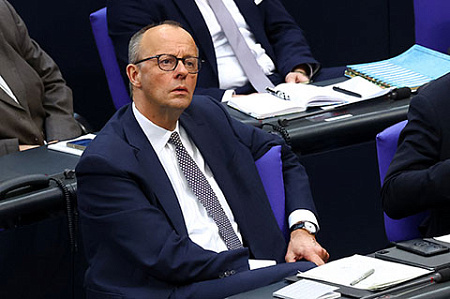
Coalition negotiations between potential partners, the Christian and Social Democrat bloc (CDU/CSU) and the Social Democratic Party of Germany (SPD), are difficult. This causes disappointment in the ranks of the CDU by the head of the Conservatives, Friedrich Merz. However, there is no full-fledged replacement for him in the role of the new chancellor. Meanwhile, the media is already linking Germany’s future to the co-chairman of the SPD, Lars Klingbeil.
German media called last Saturday, when the data of a survey conducted by the INSA Institute for the Study of Public Opinion were published, a “historic day.” On this day, the CDU/CSU’s rating equaled that of the right-wing populist Alternative for Germany (AfD). And not due to the growth of those who want to vote for the AFD, but due to the decline in the popularity of conservatives.
Their ratings are at 24%. At the same time, it should be understood that in the case of the conservative bloc, we are talking about two parties, of which the CSU operates only in Bavaria. Thus, in the rest of Germany, right-wing populists are already ahead of the Christian Democrats in the sympathies of voters.
So far, there is no exact data on those who have left the ranks of the Christian Democrats. The press, however, reports on the withdrawal of entire organizations from the ranks of conservatives at the municipal level.
From the point of view of Vladislav Belov, head of the Center for German Studies at the Institute of Europe of the Russian Academy of Sciences, Merz’s election as chancellor is not in danger, as long as the deputies of the CDU/CSU faction in the Bundestag remain loyal to him. The expert stated this in an interview with NG.
But we must not forget that the coalition agreement with the SPD on the creation of a government must be approved by the congresses of the parties involved in the negotiations. And here Merz can expect surprises. Thus, the youth wing of the CDU Junge Union has already announced that it will vote against a coalition with the SPD.
According to the leader of the CDU’s youth wing, Johannes Winkel, “the party is not just an elective association for Merz.” He stated this in an interview with Sueddeutsche Zeitung. Winkel believes that Merz cannot retreat further in negotiations with the SPD. On the currently controversial issues of migration, pensions, the economy and reducing bureaucracy, he should not make concessions to the Social Democrats.
It should be noted that the youth organization is an integral part of the CDU and will have its representatives at the party congress, which will have to approve the coalition agreement in April. Negotiations are still difficult, and for this reason, the Bundestag meeting has even been canceled this week.
Due to the uncertainty surrounding the preparation of a coalition agreement, the question arises as to whether, if anything, the Christian Democrats will be able to find a replacement for Merz. Stern magazine analyzed the current situation in the CDU and came to the conclusion that there is no full-fledged replacement for Merz. There is practically only one politician comparable in scale to Merz, and that is CSU leader Markus Zeder. But he has already voluntarily ceded leadership of the conservative bloc twice, first to Armin Laschet in 2021, and then to Friedrich Merz in 2024. The other leaders of the land scale have not yet grown to the level of Merz.
Merz wants to become chancellor so badly that he violated the fundamental requirement of the Conservatives at the last early elections – to do without government debt. Which the voters can’t forgive him for. According to the magazine, Merz was outplayed on this issue by the new, rapidly gaining SPD leader Lars Klingbeil.
Klingbeil’s goal is to become the next chancellor of Germany in 2029 (and he is not yet fifty) or even earlier if the planned black–red coalition does not stand the test of time. It is Klingbeil who is being called the future of Germany, and if he agrees to take up the post of vice chancellor, he will largely determine government policy.
But Klingbeil, keeping in mind his main political goal, intends to retain both the post of party chairman and the head of the SPD faction in the Bundestag. This combination is unusual for German politics, as preference is always given to either administrative or party work. But Klingbeil’s decision will now determine the formation of Germany’s future course, and Merz acts as an intermediary figure in this scenario.
